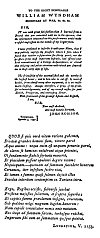
Click to enlarge
Dedication and Epigram
Proofs of a Conspiracy, by John Robison, [1798], at sacred-texts.com

Click to enlarge
Dedication and Epigram
I have preserved the original typography in the dedication and epigram, but the typography has been modernized in the rest of the text.--JBH
TO THE RIGHT HONORABLE
WILLIAM WYNDHAM
SECRETARY AT WAR. &c. as &e. SIR,
It was with great ƒatisfaction that I learned from a Friend that you coincided with me in the opinion, that the information contained in this performance would make a uƒeful impreƒƒion on the minds of my Countrymen.
I have preƒumed to inƒcribe it with your Name, that I may publicly espreƒs the pleaƒure which I felt, when I found that neither a ƒeparation for thirty years, nor the preƒƒure of the moƒt important buƒineƒs, had effaced your kind remembrance of a College Acquaintance, or abated that obliging and polite attention with which you favored au in thoƒe early days of life.
The friendƒhip of the accompliƒhed and the worthy is the higheƒt honor; and to him who is cut off, by want of health, from almoƒt every other enjoyment, it is an ineƒtimable bleƒƒing. Accept, therefore, I pray, of my grateful acknowledgements, and of my earneƒt wiƒhes for your Health, Proƒperity, and increaƒing Honor.
With ƒentiments of the greateƒt Eƒteem and Reƒpect,
I am,
SIR,
Your moƒt obedient,
and moƒt humble Servant,
JOHN ROBISON.
EDINBURGH
September 5, 1797.
QUOD ƒi quis verâ vitam ratione gubernet,
Divitiæ grandes homini ƒunt, vivere parcè
Æquo anima: neque enim eƒt unquam penuria parvi,
At claros ƒe homines voluêrunt atque potentes,
Ut fundamento: ƒtabili fortuna maneres,
Et placidam poƒƒent opulenti degere vitam:
Nequicquam.--quoniam ad ƒummum ƒuccedere honorem
Certantes, iter infeƒtum fecêre viaï,
Et tamen a ƒummo quaƒi fulmen dejicit ictos
Invidia interdum contemptim in Tartara tetra.
Ergo, Regibus occiƒis, ƒubverƒa jacebat
Priƒtina majeƒtas ƒoliorum, et ƒceptra ƒuperba;
Et capitis ƒummi præclarum inƒigne, cruentum,
Sub pedibus volgi magnum lugebat honorem:
Nam cupidè conculcatur nimis ante metutum.
Res itaqe ad ƒummam fæcem, turbaƒque redibat,
Imperium ƒibi cum ac ƒummatum quiƒque petebat.
LUCRETIUS, V. 1153.
Note: The following Latin and English texts of the above passage were not in the original book, they are supplied for reference.--JBH
...quod siquis vera vitam ratione gubernet,
divitiae grandes homini sunt vivere parce
aequo animo; neque enim est umquam penuria parvi.
at claros homines voluerunt se atque potentes,
ut fundamento stabili fortuna maneret
et placidam possent opulenti degere vitam,
ne quiquam, quoniam ad summum succedere honorem
certantes iter infestum fecere viai,
et tamen e summo, quasi fulmen, deicit ictos
invidia inter dum contemptim in Tartara taetra;...
Ergo regibus occisis subversa iacebat
pristina maiestas soliorum et sceptra superba,
et capitis summi praeclarum insigne cruentum
sub pedibus vulgi magnum lugebat honorem;
nam cupide conculcatur nimis ante metutum.
res itaque ad summam faecem turbasque redibat,
imperium sibi cum ac summatum quisque petebat.
But men wished glory for themselves and power
Even that their fortunes on foundations firm
Might rest forever, and that they themselves,
The opulent, might pass a quiet life-
In vain, in vain; since, in the strife to climb
On to the heights of honour, men do make
Their pathway terrible; and even when once
They reach them, envy like the thunderbolt
At times will smite, O hurling headlong down
To murkiest Tartarus, in scorn;
And therefore kings were slain,
And pristine majesty of golden thrones
And haughty sceptres lay o’erturned in dust;
And crowns, so splendid on the sovereign heads,
Soon bloody under the proletarian feet,
Groaned for their glories gone-for erst o’er-much
Dreaded, thereafter with more greedy zest
Trampled beneath the rabble heel. Thus things
Down to the vilest lees of brawling mobs
Succumbed, whilst each man sought unto himself
Dominion and supremacy.
(Lucretius, De Rerum Naturum, Book 5, William Ellery Leonard translation)